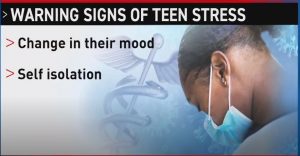 JEFFERSON COUNTY, Ala (WBMA) — Parents as we adjust to the change COVID-19 brings we continue our series on teen stress.
JEFFERSON COUNTY, Ala (WBMA) — Parents as we adjust to the change COVID-19 brings we continue our series on teen stress.
Stress can often lead to depression and anxiety.
ABC 3340 news spoke with counselors on what you can look out for and how to help.
13-year-old Victoria Rodgers enjoys sketching and drawing. It’s her way to relax when things get too stressful.
“I love to draw,” Rodgers said, “usually I only draw really when I’m stressed out as I would draw in the middle of the school day. I’ll just draw on my binder, draw on my hand, draw on my paper it just helps me calm down a lot.”
Having a positive way to cope is important. Studies show stress can lead to depression and anxiety.
“When we’re already stretched pretty much as far as we feel like we can go that’s when that fear of what might happen causes the anxiety and depression,” Exec. Dir. of Family Counseling Services Larry Deavers said.
Deavers says when it comes to teenagers dealing with stress there are some signs parents can look out for so it doesn’t spiral out of control.
First a change in their mood. “If they suddenly change to being more sad or more angry, maybe short tempered a lot,” he said.
Next, self isolation. “That might include avoiding activities or friends that they used to enjoy doing things with,” he said.
They may also try to escape reality with excessive game time.
“Some who are going through a particular issue with depression or anxiety might find a lot of comfort in being able to avoid the real world and so for them, video gaming can become almost consuming,” he said.
Arlinda Davis is a mother and a teacher of 25 years. She focuses on helping students deal with stress and trauma.
“30 percent of children who are teenagers suffer some type of stress rather it’s dealing with peer pressure or dealing with all the things they have to start to be responsible for as they grow,” Davis said.
She says teens need to have an open line of communication with someone
“Opening up a safe place for them to be able to come and you let them know, I’m here for you,” she said.
She says parents should start the dialogue.
“Parents sometimes want to stray away from being their friend,” she said, “you don’t have to be their friend necessarily but you have to open up that friendship conversation with then where they’ll feel safe to talk with you.”
When stressed some may use drinking, drugs, or eating as methods to cope.
In the next part of the series airing Wednesday we’ll focus on binge habits and how both teens and adults can get a handle on it and find other ways to deal.
by Muriel Bailey





